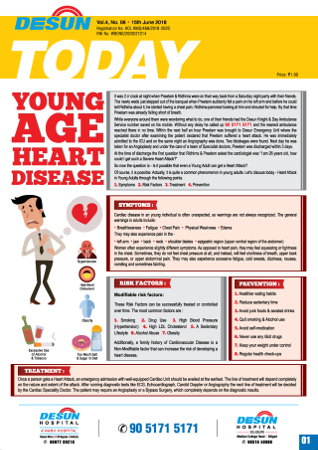


It was 2 o’ clock at night when Preetam & Ridhima were on their way back from a Saturday night party with their friends. The newly weds just stepped out of the banquet when Preetam suddenly felt a pain on his left arm and before he could tell Ridhima about it, he started having a chest pain. Ridhima panicked looking at him and shouted for help. By that time Preetam was already falling short of breath.
While everyone around them were wondering what to do, one of their friends had the Desun Knight & Day Ambulance Service number saved on his mobile. Without any delay he called up 90 5171 5171 and the nearest ambulance reached there in no time. Within the next half an hour Preetam was brought to Desun Emergency Unit where the specialist doctor after examining the patient declared that Preetam suffered a heart attack. He was immediately admitted to the ICU and on the same night an Angiography was done. Two blockages were found. Next day he was taken for an Angioplasty and under the care of a team of Specialist doctors, Preetam was discharged within 3 days.
At the time of discharge the first question that Ridhima & Preetam asked the cardiologist was “I am 26 years old, how could I get such a Severe Heart Attack?”
So now the question is – Is it possible that even a Young Adult can get a Heart Attack?
Of course, it is possible. Actually, it is quite a common phenomenon in young adults. Let’s discuss today – Heart Attack in Young Adults through the following points.
Symptoms
Risk Factors
Treatment
Prevention
Cardiac disease in an young individual is often unexpected, so warnings are not always recognized. The general warnings in adults include:
Breathlessness
Fatigue
Chest Pain
Physical Weakness
Edema
They may also experience pain in the –
Left arm
Jaw
Back
Neck
Shoulder blades
Epigastric region (upper central region of the abdomen)
Women often experience slightly different symptoms. As opposed to heart pain, they may feel squeezing or tightness in the chest. Sometimes, they do not feel chest pressure at all, and instead, will feel shortness of breath, upper back pressure, or upper abdominal pain. They may also experience excessive fatigue, cold sweats, dizziness, nausea, vomiting and sometimes fainting.
Modifiable risk factors:
These Risk Factors can be successfully treated or controlled over time. The most common factors are:
Smoking
Drug Use
High Blood Pressure (Hypertension)
High LDL Cholesterol
A Sedentary Lifestyle
Alcohol Abuse
Obesity
Additionally, a family history of Cardiovascular Disease is a Non-Modifiable factor that can increase the risk of developing a heart disease.
Healthier eating habits
Reduce sedentary time
Avoid junk foods & aerated drinks
Quit smoking & Alcohol use
Avoid self-medication
Never use any illicit drugs
Keep your weight under control
Regular health check-ups
Once a person gets a Heart Attack, an emergency admission with well-equipped Cardiac Unit should be availed at the earliest. The line of treatment will depend completely on the nature and extent of the attack. After running diagnostic tests like ECG, Echocardiograph, Carotid Doppler or Angiography the next line of treatment will be decided by the Cardiac Speciality Doctor. The patient may require an Angioplasty or a Bypass Surgery, which completely depends on the diagnostic results.